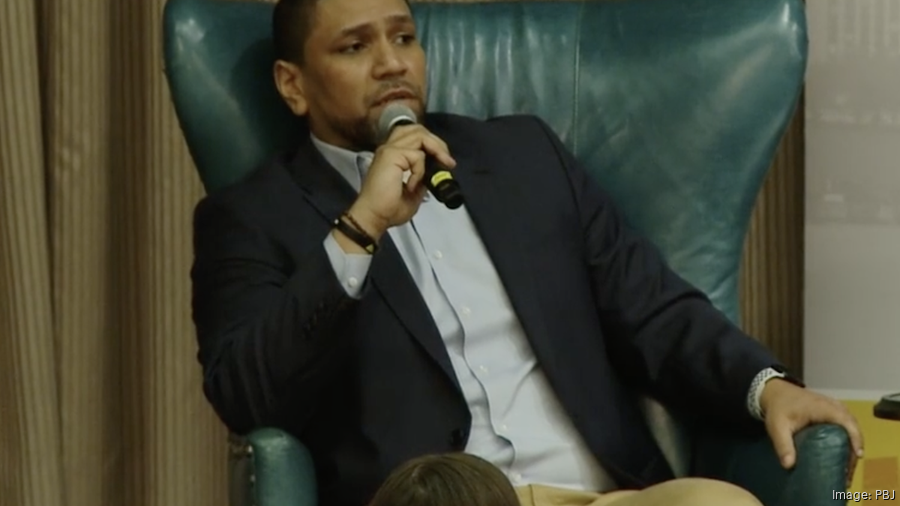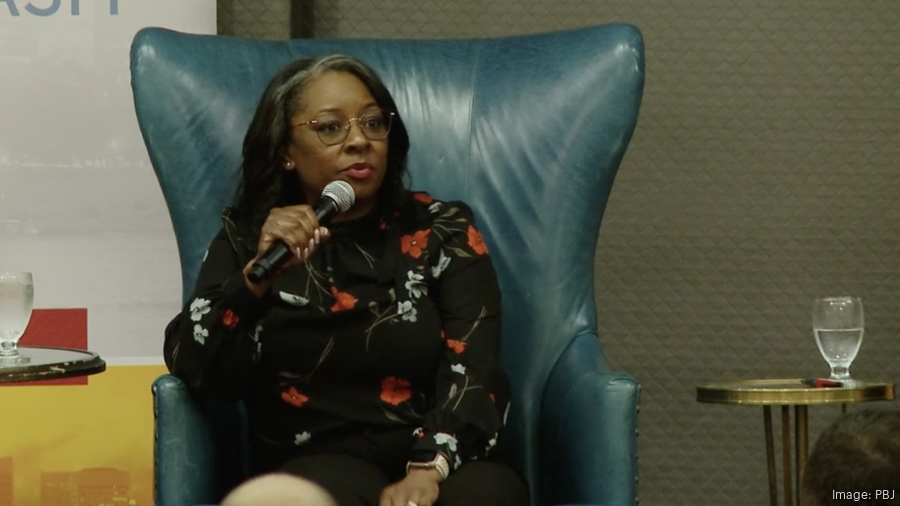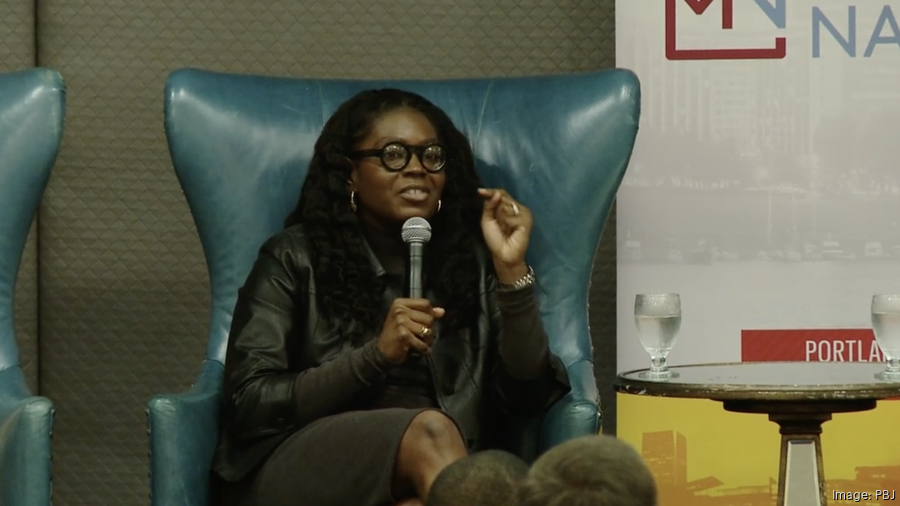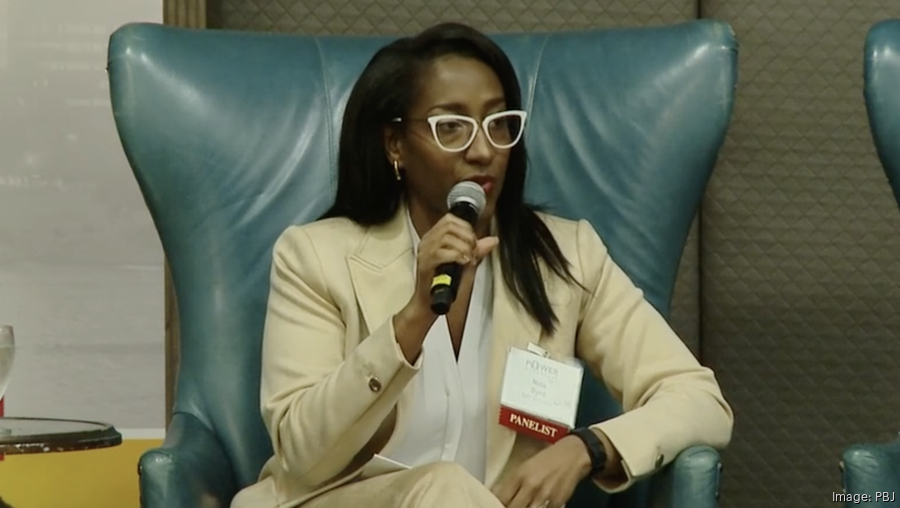Four leaders recently spoke at the PBJ’s Power Breakfast stage and shared the insights that helped them build their lauded Portland businesses. The panel included:
- Alando Simpson, CEO of COR, a disposal, recycling, and sustainability company
- Serilda Summers McGee, CEO of Workplace Change, a top area HR firm
- Nina Byrd, Principal of EXP solutions, a strategy company
- Paula Hayes, Founder and CEO of Hue Noir, which makes and sells cosmetics
Hear Alando Simpson’s full answers to two questions:
Some highlights from each speaker that Andy Giegerich, PBJ’s Managing Editor, covered in his recap article:
What’s are your biggest issues right now?
Alando Simpson: Mainly, access to capital. There was a moment when we were buying a 12-acre property: One bank wanted to give us an opportunity, only to pull the rug out from under us right at the goal line. And being a very resilient, aggressive, scrappy hustler, having a contingency plan a month in advance saved us in order to close that deal to acquire that property. The organizations that came up big for us were Business Oregon and Prosper Portland. I read their goals, their strategies, and there was a lot of conversation around sustainability, job opportunities, minority businesses, and it’s like, okay, well, then I’m gonna build a recycling facility, tell me which box I don’t check. And that essentially was our real first seed fund.

Paula Hayes: For me, there’s access to capital: As a consumer product, distribution in Portland is difficult. Prior to the pandemic, I started working on a plan to create our own sort of space here in our hometown, I fell in love with Smith Teamaker, their facility. How would you feel walking into a space where you could see the beauty products made behind the glass case? That was my big dream. But I found that without being able to forecast things like traffic, consumers coming into the space, it’s made it very hard to work through the numbers. As I looked at a few places (for retail and manufacturing), both downtown and Central Eastside, landlords were looking for very, very long terms, five to 10 years, with rates that weren’t very helpful for a business getting off the ground in a city that is still under recovery.

Nina Byrd: I’ve had, off the top of my head, 13 businesses that have moved their retail operations or storefronts out of Portland. Thankfully, all of them stayed in Oregon. But they went to Lake Oswego, they went to Beaverton, they went to Clackamas. And that’s a huge issue. If we’re going to recover, or I like to say, rebuild a vision for our downtown Portland, you can’t have a vibrant economy and a wonderful state without its central city, it’s just part of the landscape.
I’m also seeing, with a lot of my clients, this kind of old school versus new school or transplant city. There’s a lot of transplants here, but there’s a lot of people who’ve been here for a very long time, multi-generational families, five generations. There’s a lack of understanding of historical knowledge and access to not just capital, but, specifically, land. And I have two clients undergoing this process right now: If you don’t know the right person, or the right banker, or the right family, you don’t have access. That’s highly problematic if we’re going to create a vibrant economy.
Serilda Summers-McGee: The state of the world has had an impact on our business. I’m in the people and culture business. All of the tension that’s happening in the world and social media is showing up in the workplace, and it’s manifesting in the workplace. The return to the office has caused great angst. To overlay that, we’ve got several clients that are in Old Town/Chinatown, or the downtown area, and folks are saying, “You’re calling me to come into the office, two days a week, three days a week, and I have to step over poo, I don’t feel safe. The restaurants aren’t here anymore. I don’t even feel safe going out of the office at lunchtime anyway.” It’s leading them to push back even more aggressively, saying this is not a space that I can thrive in.
But the stress, the people not being happy, is great for [for McGee’s] business. It allows me to come in and help to de-escalate and figure out how we move forward. I created Workplace Change because I care about the human experience in the workplace. And that is the reason why I believe we’ve been successful: The outcome matters to us.

What’s your Outlook for 2024?
Alando Simpson: “COR’s outlook for this year, as a company, is pretty bright. We’re bringing in another layer of management this year. As anybody knows, in growing a business, there’s layers. And once you start building those layers, the complicated part is you can start losing that connection with the people that have been with you for so long, and loose your culture as an organization. And that’s hard to swallow. But, you have to start investing in and doubling down on professionals that have expertise in specific areas that you don’t. That’s how you manage growth. We’re excited about that investment into that infrastructure. I takes a different type of work upfront, but we think it’s going to save us a lot of pain down-the-road.”

Paula Hayes: My business outlook for this year is actually really good. I’m still working to get a couple of those retailers to give me a couple locations here, and I’m gonna fight that fight, But I’m also now in a place where early on everyone told me, if the retailers give you a deal, just take the deal and figure it out later. I am not doing that anymore. And it feels really good. I’m picking and choosing, and I actually feel really good about that. We’re able to be a lot more strategic.
Serilda Summers-McGee: Business is doing well. We’ve got some new services. Restorative harmony is one of the things that we are moving really aggressively right now. There is so much friction and tension that’s happening, so much name calling that’s happening inside organizations…When you call them names, it turns the conversation about that name you call them instead of about what needs to change in their behavior to move the dial. We need to restore some harmony and some respect, while also holding people accountable to what it is that they’re doing.
Nina Byrd: Our outlook is good. We are also one of the businesses fortunately, unfortunately, that profited quite well during the pandemic, because we solve problems, and everybody had 99 problems. In 2021 and 2022, with so many inquiries, we had a waiting list. In our last quarter, we’re going to grow, our forecasting is about 26%. This year, we don’t want growth that’s too rapid. I’ve done that before. I’ve owned other businesses, I’ve sold them. And I like my work life balance.

If you’re ready to learn more about, or assist COR with our sustainability solutions, building Oregon’s circular economy, or upcycling to divert more waste from landfills, contact us today!